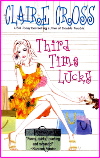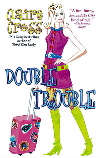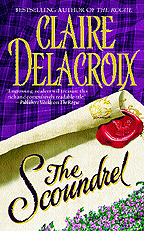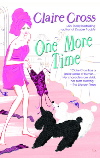
Today on Make-believe Mondays I'm pleased to introduce Claire Delacroix my friend from RWAonline. Claire writes historical medieval romance as Claire Delacroix and she also writes contemporary romance under the name Claire Cross.
Claire, first, tell us a little bit about the manuscript you’re working on now.
Claire: Right now, I'm writing ALL OR NOTHING, the fourth and final book in the Coxwell siblings series, a Claire Cross contemporary romance for Berkley Sensation.

(The earlier titles were THIRD TIME LUCKY, starring Philippa Coxwell;

DOUBLE TROUBLE, James Coxwell's story; and ONE MORE TIME, Matt Coxwell's book, which will be out in October.) The hero is Zach Coxwell, the youngest son and resident troublemaker. He's funny, which makes him entertaining to write about, even if he is a bit of a challenge. (Unpredictable, impulsive, reliant upon his considerable charm - you know the type.) The heroine, Jennifer, thinks he's a rich kid who doesn't take anything seriously, but is enchanted by him all the same - mostly because he keeps surprising her. I'm enjoying it: the two strike sparks off each other every time I put them together and they push each other, which I like a lot.
Debra: This sounds like a fun read. I can't wait!
Mark Twain said, “You cannot depend on your eyes when your imagination is out of focus.” How do you fill your creative well to keep your imagination in focus?
Claire: It sounds as if you have also read Julia Cameron's THE ARTISTS' WAY - I think the well metaphor is hers. She has a lot of good advice, mostly about being kind to your inner artist so that you can continue to create. I've found her book to be very useful and still do my morning pages.
Debra: Yes, it may be one of hers. Actually you were the one who recommended it to me about a year ago. Thank you Claire. I found it to be very uplifting. Its the kind of book I can return to and always get something more out of it.
Claire: It's important to remember that writing books is not the same as producing widgets - it requires more energy and more mental stimulation. So, over the years, I've gotten better at being kind to myself and have struck a balance: I work a limited number of hours per day and deliberately spend time doing things that I know my inner artist likes - mostly pursuing color. I go to art galleries and museums, visit gardens, prowl through knitting wool and quilting stores. I knit and quilt and garden myself, all of which are activities with a repetitive routine. This kind of repetition lets stories take shape in my mind while I'm not paying attention - much like dreaming. My subconscious gets bored and wanders off to find something else to do.
Like fix my plot. Bingo! I'll be up to my knees in uprooted periwinkle and suddenly know exactly what comes next. It's like magic.
Debra: I can just picture you in your garden amid the periwinkle, daydreaming a new story.
Is there a point when your characters begin to come alive and you can see and hear them?
Claire: Sometime in the first 100 pages of a manuscript, I'll start to hear the characters talking. This is usually when they seize the plot and run in a different direction than the one I'd anticipated.
Debra: Oh, don't you just love it when that happens?
Claire: I tend to think of my imagination as a rental apartment: with each new book, I choose the new tenants, then give them time to settle in and arrange their things. When they start talking to each other, I start eavesdropping, like a nosy landlady, and that's when the book comes to life. They get evicted when the book is done, but not all of them depart quietly. Those ones come back for cameo appearances in subsequent books.
Or they just haunt me, as Darg and Isabella are doing now. Too bad the fairy Darg doesn't know enough about sex (or anything, really) to satisfy Isabella's curiosity. Then they could solve everything without me.
Debra: Darg is such a fun and unpredictable character. She would likely solve things in a very unexpected way!
Some very famous authors have played with language, creating words for people or places that no one has ever heard of. Have you ever played with words in that way and if so how?
Claire: Well, I've made up fictional locations for my historicals, but probably everybody does that.
I've also just finished the first book in a mystery series set in the future, and that was an interesting challenge with language. In this fictional world, there was technology that we don't have (yet) which needed to be named. I didn't want there to be a language barrier, so I nudged words that already exist toward new meanings. I think that people are more likely to adapt existing words to name new technology and ideas, at least colloquially. That makes my fictional world both familiar and not, which was a lot of fun.
Debra: Fascinating. I like the idea of finding new meanings for words we already know. So you're trying something quite new!
Claire: (Keep your fingers crossed for Lilia's story, please - it's in New York, even as we speak.)
Debra: Oh yes, I'll cross fingers and toes.
For some writers, dreams play a role in creating fiction. Has this been true for you? Have you ever dreamed a scene or an image that later wound up in one of your books?
Claire: Actually, I use dreaming as a writing technique. I tend to paint my characters into corners (metaphorically speaking) and whenever I can't figure out the answer, I try to dream it. This isn't as nutty as it sounds - the subconscious is really good at solving problems. Before going to sleep, I focus on the issue in the book and review all the facets of it that I can recall. It's quite common that I awaken in the morning with the answer in my head, either the dialogue of the new scene running or a dream still in my mind's eye providing the answer. I've seen other authors give credit to this technique, too, which is reassuring as it sounds a bit crazy.
Debra: I've always suspected dreams play a larger role in the creation of fiction than most people realize. It's definitely something to try.
If there were no categories for books, no reader expectations to meet, and you could create the wildest work of imagination that you could think of what kind of story would that be?
Claire: Well, some people might argue that I don't think enough about the market! I tend to follow my characters and my muse, and don't worry about marketing when I'm excited about a story. When I do think a lot about the romance market, I come to different conclusions about it than everyone else. For example, I believe that the genre has suffered in the last decade from too much determination - on the part of both editors and writers - to make books "safe". There's a uniformity in the genre that wasn't there even ten years ago, and especially not twenty years ago. And I think that this insistence upon alpha heroes and feisty heroines, for example, on protagonists that are always sympathetic has disappointed a number of readers. Do all historicals have to be set in Scotland? Why can't we have a real character arc, and show a protagonist being changed by the power of love? Readers who savor diversity and unpredictability in their fiction - according to my theory, at least - have left the romance section, which is why romance genre sales are dropping.
Debra: Claire, it is so good to hear you say this. I think writers need to hear this and they need to be willing to be a bit more daring with their fiction so that we have more diversity and more choices as readers.
Claire: For this reason and for the creative challenge, I decided about five years ago to write romances that pushed the boundaries of expectations. I thought, actually, that the romance market was ready for some fresh thinking. For Claire Delacroix these included:

• THE ROGUE, an historical romance written in first person from the heroine's point of view in which she's uncertain of the hero's motives, like those Gothics we used to love;

• THE SCOUNDREL, an historical romance written in first person, half of the book from the hero's point of view and half from the heroine's, in which the hero who is the eponymous scoundrel is reformed by love;
• THE WARRIOR, an historical romance with a reincarnation element to the story, in which the heroine has dreams, the hero has visions of their past together and they both think they're losing their jellybeans.
Claire Cross, of course, has the Coxwell family series, which also defy conventions of the romance genre with their ChickLit tone and exploration of taboos.

• ONE MORE TIME (October 2006) is about a married couple, Matt and Leslie, who split up at the beginning of the book. Even worse, Matt goes to stay with an old girlfriend, but Leslie still wants to save their marriage.
 • In ALL OR NOTHING, Zach has a history of encounters with law enforcement officials. Does that mean he can't grow up and become an adult, fall in love and make something of himself? I think that loving Jen can prompt him to do so, and I'm going to prove it!
• In ALL OR NOTHING, Zach has a history of encounters with law enforcement officials. Does that mean he can't grow up and become an adult, fall in love and make something of himself? I think that loving Jen can prompt him to do so, and I'm going to prove it!These books are about real characters, not about fantasized archetypes, and I think that makes them more compelling and more interesting. All of these stories are about love redeeming characters, which is the fundamental premise of a romance but one that seems to have gotten lost in the shuffle. If we believe that love can and does conquer all, shouldn't we as writers give love a real challenge? It's not much of a triumph if love only conquers a misunderstanding!
Debra: Yes!
Claire: I believe that love really does reshape lives and I want to show its power at work in my books. I want to give it something to fix - because really, I'm only going to believe that the protagonists of a romance have built a relationship that can go the distance if I get to watch them face a very serious challenge.
• For example, Jen, the heroine in ALL OR NOTHING, is a breast cancer survivor. You will guess, then, that the root of her fear is that Zach will only hang around for the good times and that if she has a recurrence, he'll bail (like her last boyfriend did). So, guess what happens near the end of the book? Zach has to face that test, that twist has to happen, so that Jen and all of us know that he's the hero for her. It's not a lot of fun to put your characters through the wringer, but I need to know (and all readers need to know) that Jen and Zach really will be happy ever after.
I've never thought these books were that risky - and still don't - in fact, I think they're necessary. Writers are the creative party in the publishing triumvirate (agent, editor, author) and it's our responsibility to find new stories to tell and new ways of telling them.
Debra: Yes!
Claire: I do know that these have been the most satisfying books creatively that I've ever written: they challenged me and are my best work to date. Isn't that why we're writers in the first place? To tell our stories in the most compelling way possible? That's certainly why I signed up for this dream job. Otherwise, we might as well all be delivering pizza.
Debra: It is a dream job, isn't it? Claire, thank you for joining us here on this Make-believe Monday to share a little bit of the magic of writing with our readers.
Claire: Thanks for inviting me, Debra. It's been fun.
Debra: I'm so glad!
You can visit Claire at http://www.delacroix.net




No comments:
Post a Comment